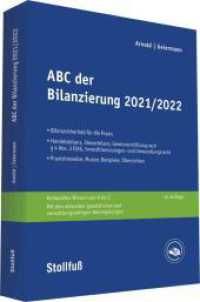- ホーム
- > 洋書
- > ドイツ書
- > Mathematics, Sciences & Technology
- > Technology
- > mechanical engineering & production engineering
Description
(Short description)
The fulfilment of the European CO2 reduction targets until 2050 needs realistic technical solutions. An economic and sustainable development towards climate neutral mobility requires a holistic view on base of life cycle assessments for the different mobility approaches. The international colloquium aims to contribute to the development of a sustainable and affordable mobility of tomorrow.
(Text)
With the signing of the Paris Agreement in December 2015 the United Nations explained their willingness to limit the GHG Emissions and contribute to the measures against the global warming effect. In 2019 the European Commission proposed the Green Deal and as a consequence the target to be climate neutral in 2050. In consequence the fossil based energy system has to transform into a climate-neutral energy system with renewable and sustainable energy carriers. Research on and development of alternative fuels and new production processes are ongoing to provide the technical solution. Political actions are needed to provide the economic framework for the introduction of such alternative fuel solutions.The fulfilment of the European CO2 reduction targets until 2050 needs realistic technical solutions including backwards compatible approaches for existing vehicle fleets. An economic and sustainable development towards climate neutral mobility requires a holistic view based on life cycle assessments for the different mobility approaches including the economic impacts as well as financing options.A synergetic discussion of solutions for future fuels and powertrain technologies is needed to develop an economic pathway to a sustainable and affordable mobility of tomorrow.The challenging goal for mobility can only be achieved through an international cooperation of universities, the automobile industry, energy producers, the oil industry and the legislative bodies of the member states.The international colloquium aims to contribute to the development of a climate-neutral mobility by exchanging views on and discussing all aspects connected with the "powertrain/fuel/environment" system, including the necessary political regulations.
(Table of content)
Perspectives on Renewable Fuels Renewable Fuels Production Fuels Quality Research Application of Renewable FuelsThe present volume contains the contributions submitted in advance for the lectures and shows the potentials and challenges of CO2-reduced mobility.








